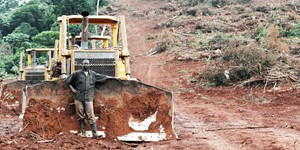The central aim of European Development Financial Institutions (DFIs) is to foster growth and reduce poverty. Yet in Africa, evidence is mounting that they have funded ‘forestry’ projects which have caused deforestation, possible land grabs, and undermined communities’ livelihoods.
DFIs are specialised banks or subsidiaries which provide funds for developing world projects which would otherwise struggle to raise capital. They are funded partly with public money and provide funds - either by buying shares or providing loans or guarantees - to investors for high risk projects in developing countries. In 2015, the investment portfolio of the 15 European DFIs amounted to €36 billion, of which around €2.2 billion went to agribusiness.
A new report for a group of NGOs led by Fern documents nine controversial or questionable cases involving eight European DFIs - but these examples of DFIs apparently sabotaging their own stated goals may be just the tip of the iceberg. The report highlights the need for greater scrutiny of DFI investments, especially by national parliaments.
Three DFIs appear especially problematic.
Finland’s DFI, Finnfund has seven investments in the forestry sector, three of which involve possible land grabs – two in Uganda and one in Tanzania. Norway’s DFI, Norfund has 11 investments in agribusiness which involve four case studies highlighted in the report, all in Tanzania and Uganda. And Dutch DFI, FMO has 20 investments in African agribusiness of which three figure in the report.
One hugely controversial project in Uganda is a documented land grab by the New Forests Company, a firm incorporated in Mauritius. Analysis by Oxfam found that an estimated 22,500 people had been evicted from their homes and land in two districts to make way for the company’s wood plantations between 2006 and 2010. Yet the New Forests Company has been part-financed by FMO, Finnfund and Norfund to the tune of around €21 million. The role of another DFI, the European Investment Bank, is especially concerning: it lent the company €4.6 million in 2008 explicitly to help it expand operations into a forest which resulted in the eviction of 7,200 people, according to Oxfam’s estimate.
Both Finnfund and FMO agreed to fund the New Forests Company after Oxfam published its report and a World Bank-sponsored investigation began, yet neither mention this on their websites. FMO simply states that such forestry investments have a ‘large economic benefit’, without mentioning any displacements of people.
Five other DFIs – Germany’s DEG, Dutch FMO, Belgium’s BIO, the UK’s CDC and France’s Proparco - are supporting another heavily criticised project, this time managed by Feronia, a Canadian company registered in the Cayman Islands, which runs three oil palm plantations in the Democratic Republic of Congo.
NGO reports raise serious questions about Feronia’s land acquisition process and the working conditions on its plantations. Local villagers assert that Feronia is illegally occupying over 100,000 hectares of land. At one plantation, community leaders say the company prevents people from raising livestock or farming within the company's concession, even on lands that it has abandoned. There are also grievances among workers concerning low pay, company refusals to hire long-term workers on a permanent basis, and poor living conditions. In response, Feronia and the DFIs have defended the company’s operations, refuting the key allegations.
The nine cases identified in the report may be only a fraction of problematic projects. Little research has been undertaken on most DFI investments and media coverage has been scant. Neither are the DFIs themselves fully transparent: some of their websites do not even provide a full list of their investments and most give only brief favourable information on projects, containing no independent analysis.
NGOs are increasingly questioning the developmental impact of European and other DFIs. It is clear that DFIs need to be subject to proper democratic scrutiny and held to account by parliaments. European institutions, notably the Parliament, should conduct an audit of the impact of DFI investment on land grabbing and deforestation. But the DFIs themselves need to open themselves up to independent scrutiny of their investments to improve their developmental impact and ensure they fund the right projects. They should also publish the complete financial reports of companies receiving investments, including their subsidiaries.
DFIs must subject their investments to better screening: they should improve their internal guidelines to ensure their investments do not contribute to land grabs and deforestation. A culture shift is also needed. When faced with criticism by NGOs or others, the current stock DFI response is to simply defend an investment and issue a collective response with the company. This is simply not good enough. DFIs must act upon allegations and findings of adverse impacts from projects they invest in and be more open to external criticism.
Mark Curtis is an independent analyst and consultant, and director of www.curtisresearch.org
Download the report "European Development Finance Institutions and land grabs: The need for further independent scrutiny": https://www.grain.org/bulletin_board/entries/5798-are-european-taxpayers-funding-land-grabs-and-forest-destruction.pdf
